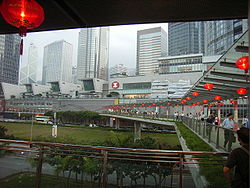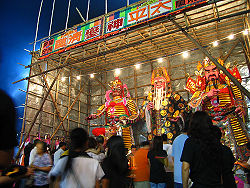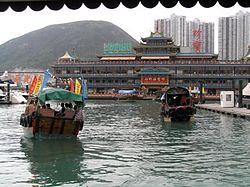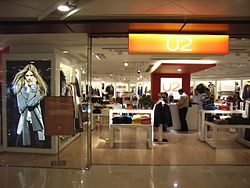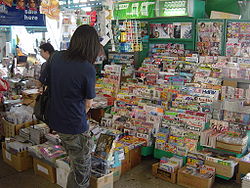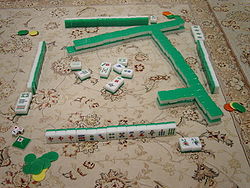- Culture of Hong Kong
-

Demographics and Culture of Hong Kong Demographics Census · Health · Hong Kong people · Hong Kong residents · Hong Kong Identity Card · Languages · Religion · Right of abode
Culture Cinema · Cuisine · Manhua · Media · Music · Opera · Public holidays · Shopping · Sport · Literature
Other Hong Kong topics Economy · Education · Geography · History · Politics · Hong Kong Portal
The culture of Hong Kong can best be described as a foundation that began with China, and became more influenced by British colonialism. Despite the 1997 transfer of sovereignty to the People's Republic of China, Hong Kong continues to hold an identity of its own.[1]
People in the culture
Main articles: Demographics of Hong Kong and Chinese social relationsMost Hong Kong ethnic Chinese people naturally lean toward eastern culture, because demographically they are the majority. On various social aspects, the bottom-line Chinese values of "family solidarity", "courtesy" and "saving face" carry significant weight in the culture. Heavy influence is derived from Cantonese culture from the neighbouring province of Guangdong. There are also substantial communities of Hakka, Fukien, Teochiu and Shanghainese people.
Social
 Happy valley housing estates
Happy valley housing estates
Structurally, one of the first laws to define people's relationships was the 1972 "Hong Kong Matrimonial Ordinance". The law set the precedence to ban concubinage and same sex marriages with a strict declaration for heterosexual relationships with one partner only.[2]
Other economic changes include families in need of assistance due to both working parents. In particular, foreign domestic workers have become an integral part of the household since the late 1980s.
Languages
Main articles: Languages of Hong Kong and Hong Kong CantoneseCantonese is the most widely spoken language in Hong Kong. Since the 1997 handover, the government has adopted the "biliterate and trilingual" (兩文三語) policy. Under the principle, Chinese and English must both be acknowledged as official languages, with Cantonese being acknowledged as the de facto official Chinese language in Hong Kong, while also accepting the use of Mandarin.[3]
Religion and beliefs
Chinese New Year is the most important celebration in the Hong Kong culture. Chinese Folk Religion plays an integral part of the culture. Unlucky sayings are considered offensive, and many people travel yearly to the cemetery on Tsing Ming festival to honour and worship their ancestors. There are several major shrines in Hong Kong, and many smaller shrines to the local Gods and Goddesses of the earth line the streets. Objects like bagua mirror are still used regularly to shield evils. Numbers in Chinese culture also play a role in people's everyday life. Numbers like "4" (because of its similarity to the Chinese word for "(to) die") are avoided when possible by believers.
Holidays
Main articles: Traditional Chinese holidays and Public holidays in Hong KongThere are some distinctive holidays that are celebrated in Hong Kong as a part of eastern culture, and not generally in western countries, except among certain overseas Chinese communities. The most well known is Chinese New Year, which occurs approximately a month after Gregorian New Year, variably in late January or early February. Other events include the Dragon Boat Festival, where zongzi is made by millions at home as part of the tradition. Dragon boats also compete for regional awards. Mid-Autumn Festival is another highly celebrated event, involving the massive purchase of mooncakes from Chinese bakery shops.
Pop culture
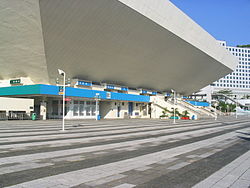 Hong Kong Coliseum also is a cantopop concert venue
Hong Kong Coliseum also is a cantopop concert venue Main articles: Music of Hong Kong and Cantopop
Main articles: Music of Hong Kong and CantopopMusic: Cantopop has dominated and become synonymous with local music culture since its birth in Hong Kong. While many other forms of music exist, Cantopop still enjoys mass popularity. However, the global influence of Mandarin has influenced the style. Mandopop from Taiwan and China is fast gaining ground. Most artists are essentially multilingual, singing in both Cantonese and Mandarin.
TV Dramas: Besides from the staple of TVB dramas, citizens also watch a substantial number of dramas from Japan, Korea and Taiwan. The most notable is Korea's Dae Jang Geum. Its 2005 broadcast on TVB was extremely popular. On the night of the series' finale, the streets were unusually quiet, due to people staying at home to watch it.
Celebrity: Hong Kong can be described as "gossip mad". The personal lives of singers, actors and celebrities in general are popular conversation topics and tabloid material. Hong Kong's thirst for gossip is not limited to local celebrities, but extends to celebrities from Taiwan, Japan, and to a lesser degree, those from Korea and Mainland China. Many gossip magazines are also in circulation, and one of the most notable (or notorious) sections is the "HD Reality" section. Introduced after the implementation of HD broadcasting, the highly popular section shows HD photos of celebrities and analyses their attractiveness or unattractiveness.
Food
Main article: Cuisine of Hong KongFood holds an important place in Hong Kong culture. From dim sum, da been lo, fast food, to the most rare of delicacies, Hong Kong carries the reputable label of "Gourmet Paradise" and "World's Fair of Food".
Shopping
Westernised stores such as U2 are numerous Main article: Shopping in Hong Kong
Main article: Shopping in Hong KongHong Kong is identified by its materialistic culture and high levels of consumerism. Shops from the lowest end to the most upscale pack the streets in close proximity. Some popular shopping destinations include Mongkok, Tsim Sha Tsui, and Causeway Bay.
Cinema
Main article: Cinema of Hong KongThe industry has been one of the most successful worldwide, especially during the second half of the 20th century. It remains prominent despite a severe slump starting in the mid-1990s. Martial artists and stars such as Jackie Chan and Bruce Lee are known globally, especially in Chinese settlements overseas. Many have transitioned over to Hollywood, including Chow Yun-fat and John Woo. Hong Kong cinema has received international recognition for directors such as Wong Kar-wai.
Mass media and publishing
Newsstand at Star Ferry Pier Main articles: Media in Hong Kong and Communications in Hong Kong
Main articles: Media in Hong Kong and Communications in Hong KongHong Kong has two broadcast television stations, ATV and TVB. The latter, launched in 1967, was the territory's first free-to-air commercial station, and is currently the predominant TV station in the territory. Paid cable and satellite television have also been widespread. The production of Hong Kong's soap drama, comedy series and variety shows have reached mass audiences throughout the Chinese-speaking world. Many international and pan-Asian broadcasters are based in Hong Kong, including News Corporation's STAR TV. Hong Kong's terrestrial commercial TV networks, TVB and ATV, can also be seen in neighboring Guangdong Province and Macau (via cable).
Magazine and newspaper publishers distribute and print in numerous languages like Chinese and English. The printed media, especially tabloids but also broadsheet newspapers, lean heavily on sensationalism and celebrity gossips. While the practice is criticised, it continues to sell papers. The media is relatively free from government interference compared to that of mainland China, and newspapers are often politicised; some show skepticism toward the Chinese government in Beijing.
Manhua (Comics)
Main article: ManhuaManhua are Hong Kong based comic books that have provided an avenue of expression long before the arrival of television. While readership has fluctuated throughout different decades, the art is one of the most consistent in terms of providing highly affordable entertainment. Manhuas are regularly available at news stands in most street corners. Characteristics of Old Master Q, Chinese Hero and many others have undoubtedly showcased Chinese artwork and stories. Japanese manga have also been translated and fused into local manhua libraries.
Animation
Main article: Chinese AnimationWhile Hong Kong has had an endless supply from Japanese anime and US Disney animations, China has been trying hard to revitalise the industry. Hong Kong has made contributions in recent years with productions like A Chinese Ghost Story: The Tsui Hark Animation and DragonBlade. Most notably, companies like Imagi Animation Studios located directly in the territory are now pushing 3D-CG animations into the market. Most anime are broadcast early on weekend mornings.
Cantonese opera
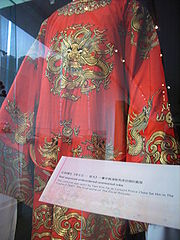 A cantonese opera costume
A cantonese opera costume Main article: Cantonese Opera
Main article: Cantonese OperaCantonese opera is one of the major categories in Chinese opera, originating in southern China's Cantonese culture. The art carries a national identity that goes as far back as the first wave of immigrants to arrive from Shanghai in the 1950s. Sunbeam Theatre is one of the places that hold the tradition. Like all versions of Chinese opera, it is a Chinese art form involving music, singing, martial arts, acrobatics, and acting.
Performing arts
Hong Kong has different kinds of performing arts, for example, drama, dance, music and theater. Hong Kong is also home to the first fulltime comedy club in Asia, The TakeOut Comedy Club Hong Kong.[4]
Sports
Main article: Sport in Hong KongWith limited land resource available, Hong Kong continues to offer recreational and competitive sports. Locally sports in Hong Kong is described as "Club Life". Internationally, Hong Kong has participated in Olympic Games, and numerous other Asian Games events. Major multipurpose venues like Hong Kong Coliseum are found. Others include regular citizen facilities like Macpherson Stadium.
Martial Art
Main articles: Chinese martial arts and List of Chinese martial artsMartial arts in Hong Kong is accepted as a form of entertainment or exercise. T'ai chi is one of the most popular, especially among the elderly. Groups of people practise the motions in every park at dawn. Many forms of martial arts were also passed down from different generations of Chinese ancestry. Styles like praying mantis, snake fist and Crane are some of the more recognised. The atmosphere is also distinct as people practise outdoor in peaks next to ultra modern high rise buildings.
Leisure
See also: Leisure and Cultural Services DepartmentWhen not at work, Hongkongers devote much time to leisure. Mahjong is a popular social activity, and family and friends may play for hours at festivals and on public holidays in homes and mahjong parlours. The image of elderly men playing Chinese chess in public parks, surrounded by watching crowds, is common. Other board games such as Chinese checkers are also enjoyed by people of all ages. Among teenagers, shopping, eating out, karaoke and video games are common, with Japan being a major source of digital entertainmment for cultural and proximity reasons; there are also popular local inventions such as Little Fighter Online.
In the past, Hong Kong had some of the most up-to-date arcades games available outside of Japan. Negative associations were drawn between triads and video game arcades. Nowadays, soaring popularity of home video game consoles have somewhat diminished arcade culture.
Outdoor activities such as hiking, barbecues and watersports are also popular due to the local geography.
Chess is run by the Hong Kong Chess Federation.
Gambling
Mahjong table setup
Gambling is popular in Chinese culture and Hong Kong is no different. Gambling is legal only at three established and licensed institutions approved and supervised by the government of Hong Kong: horse racing (in Happy Valley and Sha Tin), the Mark Six lottery, and recently, football (soccer) betting.
Games like mahjong and many types of card games can be played for fun or with money at stake, with many mahjong parlours available. Movies such as the 1980s God of Gamblers have given a rather glamorous image to gambling in Hong Kong.
Hong Kong Jockey Club
The Hong Kong Jockey Club provides a major avenue for horse racing and gambling to locals, mostly the middle-aged. The club was established in 1844 by the British, with the first racecourse being built in Happy Valley. The club closed for a few years during World War II due to the Japanese occupation of Hong Kong. In 1975, lottery Mark Six was introduced. And in 2002, the club offered wagerings for football world championship games including the English FA Premier League and the World Cup.
Cultural Gallery
-
Shopping is a highlight
References
- ^ Lilley, Rozanna. [1998] (1998) Staging Hong Kong: Gender and Performance in Transition. University of Hawaii. ISBN 0824821645
- ^ Chou, Wah-Shan. Zhou, Huashan. [2000] (2000). Tongzhi: Politics of Same-Sex Eroticism in Chinese Societies. Haorth Press ISBN 156023153X
- ^ "Living in Hong Kong – Before You Arrive". www.outwardbound.org.hk. http://www.outwardbound.org.hk/OVERSEAS%20STAFF%20INFO%20PACK.doc. Retrieved 8 September 2011.
- ^ "Stand and Deliver", South China Morning Post
See also
- Leisure and Cultural Services Department
- Hong Kong cultural policy
- Hongkongers
- Literature of Hong Kong
- Museums in Hong Kong
- Villain hitting
- Chinese culture:
Culture of Asia Sovereign
states- Afghanistan
- Armenia
- Azerbaijan
- Bahrain
- Bangladesh
- Bhutan
- Brunei
- Burma (Myanmar)
- Cambodia
- People's Republic of China
- Cyprus
- East Timor (Timor-Leste)
- Egypt
- Georgia
- India
- Indonesia
- Iran
- Iraq
- Israel
- Japan
- Jordan
- Kazakhstan
- North Korea
- South Korea
- Kuwait
- Kyrgyzstan
- Laos
- Lebanon
- Malaysia
- Maldives
- Mongolia
- Nepal
- Oman
- Pakistan
- Philippines
- Qatar
- Russia
- Saudi Arabia
- Singapore
- Sri Lanka
- Syria
- Tajikistan
- Thailand
- Turkey
- Turkmenistan
- United Arab Emirates
- Uzbekistan
- Vietnam
- Yemen
States with limited
recognition- Abkhazia
- Nagorno-Karabakh
- Northern Cyprus
- Palestine
- Republic of China (Taiwan)
- South Ossetia
Dependencies and
other territories- Christmas Island
- Cocos (Keeling) Islands
- Hong Kong
- Macau
Categories:- Hong Kong culture
-
Wikimedia Foundation. 2010.

